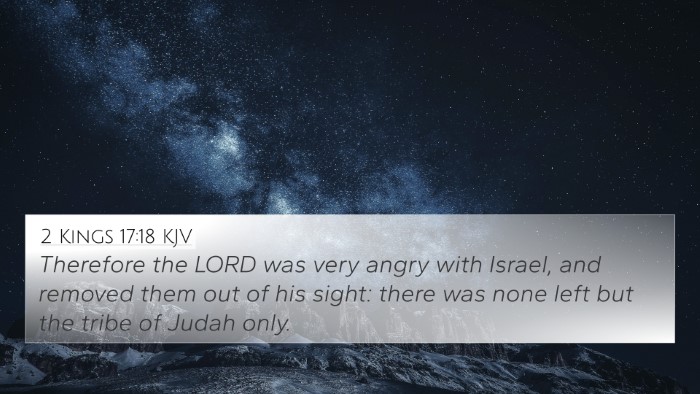Ezekiel 23:13 - Summary and Analysis
Ezekiel 23:13 reads: "Then I saw that she was defiled, that they took both one way." This verse is part of a larger prophetic narrative in which God speaks through the prophet Ezekiel, using two sisters, Oholah and Oholibah, to symbolize the kingdoms of Israel and Judah. This verse particularly emphasizes the theme of unfaithfulness and idolatry in the context of spiritual betrayal.
Meaning of Ezekiel 23:13
In this passage, the metaphor of two sisters represents the two kingdoms of Israel and Judah. Oholah refers to Samaria, while Oholibah refers to Jerusalem. The phrase "defiled" indicates a moral and spiritual corruption, pointing to their turning away from God to follow foreign deities and practices. The "one way" symbolizes unity in their sinful actions, highlighting how both kingdoms succumbed to the same temptations and failings.
Insights from Public Domain Commentaries
-
Matthew Henry:
Henry interprets this verse as a critical observation of the sinful nature of both Israel and Judah. He notes that their collective defilement signifies a deeper betrayal of God's covenant. The unity in their unfaithfulness manifests the idea that sin has a contagious nature, leading communities away from divine principles.
-
Albert Barnes:
Barnes emphasizes the importance of recognizing the shame of turning from God. He suggests that the act of "taking one way" signifies an agreement in transgressions, where both kingdoms were equally implicated in idolatry, showcasing God's disdain for their actions. This reflects how societal sin can lead to shared consequences, bringing ruin upon both Israel and Judah.
-
Adam Clarke:
Clarke's interpretation focuses on the symbolism of defilement as spiritual adultery. He parallels this to the church's relationship with Christ, warning of the consequences of disloyalty. He encourages readers to reflect on their spiritual fidelity and the importance of being set apart for God’s purposes.
Cross-References
For deeper study, the following Bible verses enhance the understanding of Ezekiel 23:13 and its themes of defilement and unfaithfulness:
- Jeremiah 3:6-10: Discusses Israel's unfaithfulness compared to Judah.
- Hosea 1:2: Highlights the whoredom of Israel against the Lord.
- Isaiah 1:21: Speaks of Jerusalem as a harlot, forsaking justice.
- Ezekiel 16:30-32: Describes Jerusalem's harlotry through idolatry.
- Revelation 17:1-5: The image of the great harlot symbolizes unfaithfulness to God.
- James 4:4: Indicates that friendship with the world is enmity against God.
- 1 Corinthians 10:6-11: Warns against idolatry using Israel's history as an example.
Connections and Themes
-
Spiritual Infidelity:
Ezekiel 23:13 thematically links to various passages highlighting spiritual unfaithfulness and the consequences of straying from God’s commands. Both the Old and New Testaments warn against the idolatry that plagues God’s people, advocating for purity in worship.
-
Covenant Relationships:
This passage exemplifies the importance of covenant relationships. Just as Israel and Judah are cautioned against idolatry, modern readers are reminded of their commitment to God. This highlights the necessity of faithfulness within one's spiritual journey.
-
Consequences of Sin:
The verse illustrates that collective sin leads to judgment. The unity found in their defilement serves as a warning to communities today about the importance of holiness and living in accordance with God's will.
Comparative Bible Verse Analysis
Comparing Ezekiel 23:13 to other verses amplifies its warning: just as Ezekiel documents the failures of Israel and Judah, other Scriptures emphasize the importance of fidelity to God across various contexts. Understanding how different passages interconnect enriches the broader narrative of divine expectations and human failings.
Tools for Bible Cross-Referencing
To study Ezekiel 23:13 and its connections thoroughly, use the following tools:
- Bible Concordance: Look up key terms to find related verses quickly.
- Bible Cross-Reference Guide: Utilize resources designed specifically for cross-referencing scripture.
- Cross-Reference Bible Study: Engage in methods that focus on thematic studies across the Bible.
- Bible Reference Resources: Use comprehensive guides that furnish detailed links between verses.
- Bible Chain References: Explore chains of related scriptures that provide depth to the study.
Conclusion
Ezekiel 23:13 serves as a powerful reminder of the call to remain faithful to God amidst a world rife with temptation. By examining this verse in conjunction with other biblical passages, readers can gain a deeper understanding of the gravity of spiritual fidelity and the implications of turning away from God's path. Utilizing various cross-reference tools allows for a richer exploration and thematic study, connecting the intricate web of scripture that speaks to issues of faith, loyalty, and divine justice.





